Oral Health
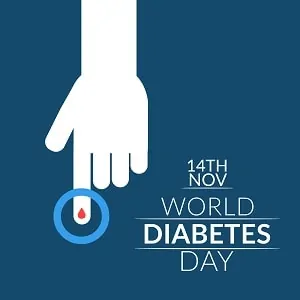
Oral Health & Diabetes
Diabetics and their caregivers are well aware of just how much the disease can affect the body, but an often overlooked side effect of diabetes is directly related or oral health. The truth is, diabetes can increase the risk for gum disease, oral infections, poor healing after dental treatment, and dry mouth. If you’re diabetic or have a loved one with diabetes, try these tips to keep oral health in tip-top shape.
Tip #1 – Regular Dental Care is Key
Practicing good dental habits at home is a great way to reduce the risk of diabetic complications related to oral health. Make sure to brush your teeth twice a day, every day, for two minutes. Use a soft-bristled toothbrush and scrub gently to avoid damaging your teeth or gums. Also, brushing your tongue and flossing every day can take your at-home oral hygiene routine one step further and remove even more plaque and bacteria. At our dental office in Sparks, we also recommend maintaining regular visits with our team so we can keep a close eye on oral health. This is especially important if you’re diabetic.
Tip #2 – Eat Smart
Those with diabetes know the importance of eating healthy to control their blood sugar levels, and we can’t stress enough how important a well-balanced diet is for your oral health, too. Minimize your sugar intake to avoid blood sugar spikes and to protect your teeth from its damaging effects. Choose fresh veggies, fruits, and whole grains for a complete diet that’s not only good for your body but also good for your smile. If you’re unsure which foods are best and worst for diabetic patients, talk with your doctor about creating a meal plan.
Tip # 3 – Level Out
Diabetics are accustomed to checking and maintaining their blood glucose levels, and for good reason. Spikes in blood glucose levels can damage essential organs such as the heart and kidneys. But increased blood glucose can also cause problems with your mouth. High blood glucose in diabetics also means a higher chance of loose teeth or even losing teeth altogether. Another oral health concern related to diabetes is gum disease. Gum disease is a serious condition for anyone, but diabetics may have more problems fighting the infection and, in turn, keeping their diabetes under control.
Join our dental office in Sparks in celebrating World Diabetes Day by wearing blue, scheduling a check-up with your doctor if you suspect you may have diabetes, and of course, always brush and floss.

We’re here to remind you…it doesn’t matter if it’s been a few months or even a few decades since your last trip to the dentist. You have nothing to be afraid of or feel anxious about. We’re here to tell you why and show you how you can feel better fast.
Tip #1 – Take Your Comfort Seriously
We understand how uncomfortable it can be to have severe dental anxiety. It’s downright debilitating for you and your smile. Your Sparks dentist will tell you that you deserve so much better! There’s a sense of calm and relaxation in everything we do. You’ll feel assured and soothed, maybe even pampered during your dental visits.
Tip #2 – Don’t Avoid Your Appointments Out of Fear
Meeting a patient of any age who is afraid of the dentist is always disheartening. Whether they have fear because of a traumatic dental experience in the past or because they don’t like doctors, we believe every patient should feel happy and worthy of a beautiful, healthy smile.
So many times, we meet patients with loose teeth, missing teeth, bleeding gums, bad breath, and more. They’re usually experiencing these issues due to untreated dental problems. The good news is, we can get you out of pain fast and fix your smile back to perfection.
Tip #3 – Know You’re Not Alone – Ever
From the moment you walk in the door to our state-of-the-art office, you’ll have someone with you, a partner who cares about your comfort. This is especially true for our most fearful or anxious patients. That’s why it’s important to discuss your worries with us before your visit, so we can be prepared to pamper you with relaxation.
Like we’ve said before, you’re not alone if you don’t like going to the dentist! The Cleveland Clinic says between 9% and 15% of Americans say they avoid going to the dentist because of anxiety or fear. Does this hit close to home for you or someone in your family? As your appointment approaches, so does the feeling of anxiety or uneasiness. Maybe your heart races and your palms begin to sweat. While this sounds like the beginning of a spooky story, we know it’s all too real for patients who are afraid of seeing the dentist.
Patients who are afraid of or anxious about getting the dental care they need are some of our most treasured patients. We’ve seen how the most fearful patient can transform into one of our best dental patients in terms of keeping up with regular checkups and cleanings.
If there’s something we can do for you to make visiting our Sparks dental office a more relaxing experience, we hope you’ll share it with us. It could make a huge impact on your life or someone else’s! Don’t hesitate to reach out to us online or by phone with questions about your oral and overall health.
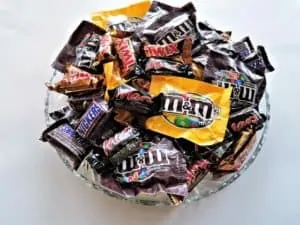
These little bite-sized treats are tricky because you think you can have one and just be done. You give in to your cravings and then “BOOM” the next thing you know there are wrappers everywhere and an empty bag to boot. We tried these three easy tips to help stop you from wanting to indulge in everything sugary and sweet, and they actually worked.
Step #1 – Drink Water (Lots of It)
We’re sure you’ve been told somewhere along the way, sometime in your life about the importance of drinking enough water daily. The key is staying hydrated so that your body can function optimally and maintain a proper eating or digestive routine. If you’re craving something sweet, don’t be tempted to reach for an energy drink or a sports beverage. They’re not healthy (like they labels might lead to you believe), and they contain sugar that sticks to teeth and leads to decay.
While opinions differ about how much water a person should consume each day, there’s a little handy, dandy trick called the 8×8 rule you can use. Most health authorities suggest drinking eight, 8-ounce glasses of water daily, or 8×8! (This is equivalent to about two liters or half a gallon).
Step #2 – Eat Healthy
Cravings for sugar are different than your body telling you it’s hungry. It’s your brain playing a little trick on you compared to when you need to refuel for energy, and your body says it’s hungry. Your mind wants you to eat the sugary treat because you’ll feel a release of dopamine as part of your body’s “reward system.” Try to opt for healthy snacks such as fruits and veggies. Go ahead and eat a meal that’s rich with protein, which is excellent for helping to curb cravings and hunger.
We understand that eating real, healthy food isn’t the same as diving into that bag of candies or indulging in that cupcake. But your body (and your smile) will surely thank you for making the right choices now, so they’re there for you in the long run.
Step #3 – Get Enough Sleep
Your Sparks dentist will be the first one to tell you how important sleep is in our lives. It does make a difference in both your oral and overall health. Sleep loss can dramatically change the timing and release of certain hormones responsible for controlling your appetite. When you’re deprived of a good night’s sleep (especially regularly), these hormones get released in larger amounts. Your stomach also releases the hormone that makes you feel full in smaller amounts, causing a perfect storm for cravings and binge on sweets.
What’s more interesting is this: studies show that we change what kinds of foods we purchase when we’re overly tired, too! Researchers found that an increase in hormone levels contributed to us wanting to buy foods that are high in calories and sugar. Both our bodies and brains crave the rewards of unhealthy foods when we get less than seven hours of sleep each night.
We hope you’ll give these three steps a shot, whether it’s on a small or even a bigger level. We know how hard it can be to say no to sweets, no matter what age you are. This time of year, with all of the added pressure, is an excellent opportunity for you to use these tools discussed here to keep your body and your smile healthy. If you have any questions about these tips or would like to know more about how to take care of your teeth, email or give our Sparks dental office a call!
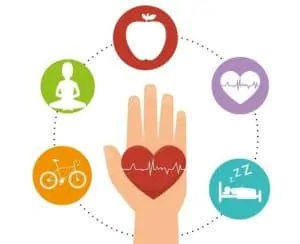
Tip #1 – Keep Your Gums Healthy
There’s a reason why this is number one! Your gum health is so critically important to the rest of your body. According to the Mayo Clinic, recent studies are revealing new evidence that oral bacteria and inflammation due to gum disease are related to a variety of health issues. They include:
– Diabetes
– Low Birth Weight
– Premature Births
– Alzheimer’s Disease
– Stroke
Tip #2 – Keep Plaque from Attacking Your Teeth
There’s a good chance that if you tested your mouth right now, there would be about 500 different types of bacteria hanging out there. Some of them are good. Some of them are not-so-good. The harmful bacteria have a good time sticking to your teeth, forming a colorless, sticky substance known as plaque. This stuff attacks your dental enamel and loves to create periodontal problems or gum disease. It’s important to keep your teeth clean and free from plaque buildup. You can do this by:
– Brushing – Remember to brush for two minutes, twice a day. If you’re unable to brush or floss, don’t forget to try at least chewing a stick of sugarless gum to help fight bacteria.
– Flossing – Flossing recently got some bad press, questioning whether it’s necessary. We’ll always tell you to say “YES” to flossing. In fact, it’s super important to help keep your gums healthy. Flossing removes the bacteria and plaque that can get stuck between your teeth where your toothbrush can’t reach. Dental floss is one of your gum’s best defenses against harmful bacteria.
– Seeing Your Sparks Dentist – Remember to keep up with your regular dental appointments and cleanings. We make scheduling a visit comfortable and convenient, so you don’t have to worry about any hassle or issues. It’s important to have regular dental care so that we can monitor any changes to your gum and smile health.
Tip #3 – Keep Eating (and Drinking) Right
Remember to treat your body and your smile right by eating healthy. One of the most significant contributors to tooth decay and gum disease is sugar. Try to limit sugary drinks and foods for you and your family. This includes sodas and sports drinks that seem to be so readily available these days. Always opt for water when you’re feeling dehydrated. Having a balanced diet is a critical element of having optimal oral and overall health. Check out the “Food Plate” guidelines courtesy of the USDA to see how easy it is to maintain a proper, simple diet. You’ll get an idea of what food options are an excellent choice and which ones you should avoid altogether.
At our Sparks dental office, we’ll always stress the importance of taking care of your teeth so the rest of your body can stay healthy too. We can’t wait to see what research uncovers as science and technology progresses each year. Always remember that giving your mouth the same attention you give the rest of your body is going to help ensure you’re able to live a long, happy life. Talk to us about scheduling your next dental visit today!
Re-posted with the permission of Perio Protect.
The end of Summer is bittersweet at best. The pool gets covered. Your sandals shuffle their way to the back of the closet. And the smell of sunscreen is slowly replaced by pumpkin spice.
But on the upside, there’s a little less chaos and a little more structure as the kids head back to school with their new haircuts and spiffy sneakers.
Though the shift may seem more dramatic than a screenager’s social media feed, back-to-school also happens to be a great time to evaluate your personal health routine along with the routines of the rest of your family. So once you remind yourself how to set the alarm clock, consider adding more thorough oral care to your morning preparations.
With Perio Protect, you can make a noticeable improvement to your oral health and minimal adjustment to your schedule.
The custom-molded Perio Trays® hold bacteria-fighting medication in the treatment zone long enough to clean deep below the gum line. But the best part is this comprehensive system won’t disrupt your morning. Consider this potential schedule.
7:00 Alarm goes off
7:09 Hit the snooze button again
7:18 Get up, panic a little
7:19 Start the water in the shower
7:20 Squeeze Perio Gel into your trays, pop ‘em into your mouth and step into the shower
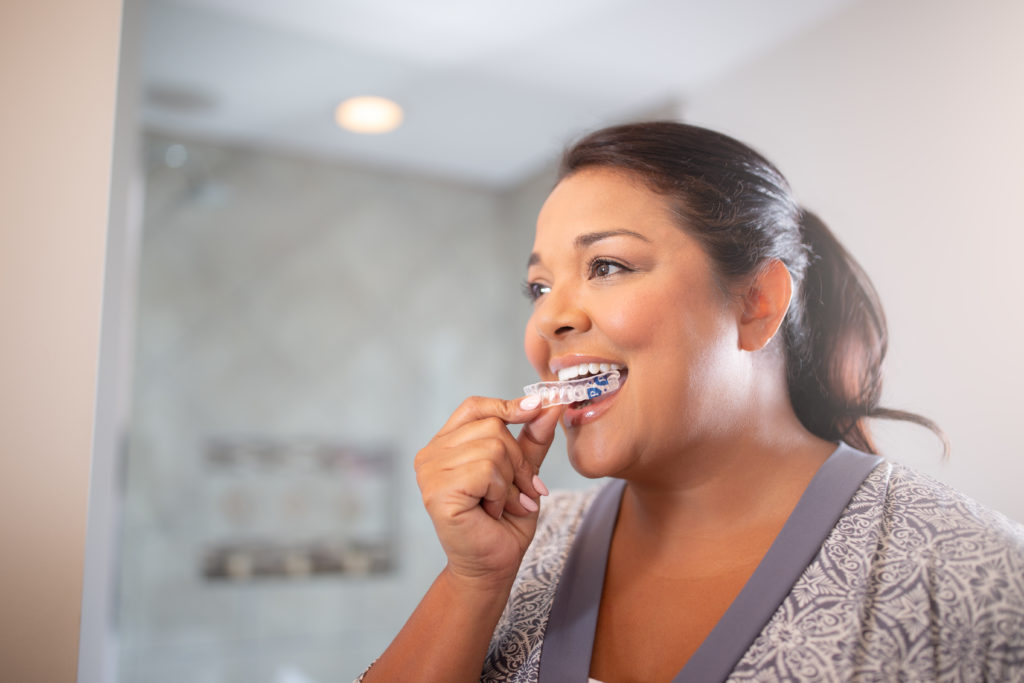
7:21 Sing songs, rinse, repeat
7:30 Dry off
7:32 Hair stuff, deodorize, clothe yourself, etc.
7:35 Pop out the trays, brush your teeth
7:45 Grab a bar and hit the door
See? It’s easy. You may not have even noticed how Perio Protect snuck right in there. But give it two weeks, and it’ll be a highly repeatable habit. You’ll experience, whiter teeth and fresher breath while you fend off gum disease-causing bacteria.
Talk to your dentist about how your can augment your routine and improve your overall health while addressing oral health.
Original content posted HERE – Read More about PerioProtect
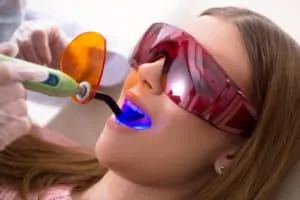
Why Do Fillings Fall Out?
Sometimes we put a lot of pressure on our teeth when we chew. This can cause a restoration to weaken and fall out. Also, as time wears on, your saliva can eat away at or loosen the bonding your Sparks dentist used to secure your filling. Sometimes the tooth that houses your restorative filling becomes subject to decay and deterioration. Other times fillings simply fall out because we bite down on something hard like a candy or popcorn kernel. Whatever the reason for your failing filling, be sure to have it fixed as soon as possible. Your tooth will be exposed to bacteria and unwanted food particles, causing sensitivity and even decay down the road.
What Should I Do Now?
First things first, give our Sparks dental office a call. If you’re unable to do that or get to the office right away, we have some tips to help you with your failed filling.
Tip #1 – If your filling didn’t fall out entirely or is loose, see if you can get it out — gently. If it stays in, there’s a chance you could swallow it or even choke.
Tip #2 – Your unfilled tooth is a welcoming environment for harmful bacteria to make a home and destroy your tooth. Be sure to brush gently and carefully. Rinse with water to make sure you’re removing any debris. Saltwater is great! Mix one cup of warm water, and one teaspoon of salt then rinse.
Tip #3 – Watch what you eat so that you don’t further damage your tooth. Avoid things that are sticky or hard. You don’t want anything getting stuck in your tooth or run the risk of breaking it when you bite. Keep foods simple and soft until you get a new filling.
Tip #4 – If you’re experiencing any sensitivity or pain, it’s usually OK to take over-the-counter pain medication to dull your discomfort. Try not to use any temporary dental cement to put your filling back in place. They tend to be messy, and you run the risk of further damaging your tooth.
What Will the Dentist Do?
One of the first things we’ll do when you come for a visit is to assess your damaged tooth thoroughly. We might even take some digital photos, too. We’ll use our training and cutting-edge technology to figure out what’s the best fit for your smile. If your tooth has not deteriorated or if it’s not severely decayed, we’ll be able to fix it with a new filling. Whatever treatment you need, take comfort in knowing you’re always in good hands at our dental office in Sparks.
We hope you learned a little something here today and that you’re able to get to the dentist soon. Failing or lost fillings are no fun! There’s no reason to panic though there’s a simple solution for every smile. We’re happy to be your dental partner and get your smile healthy and happy again!
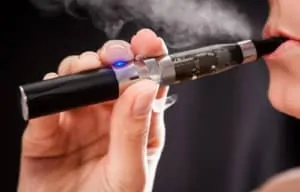
Whole Body Concerns
Vapes, or e-cigarettes, have been in the U.S. since 2007, but their popularity seems to have increased rapidly over the past few years. Because of this dramatic surge in popularity, science and research regarding these devices is a little behind. But recent studies show us that maybe vaping isn’t as safe as we may have thought. Vaping may be linked to an increased risk of pneumonia, rapid heart rate, congestive heart failure, and stroke. So while we may have once believed vaping was a safer alternative to smoking, that simply may not be the case.
Oral Health Concerns
More research on how vaping affects oral health is needed, but more and more studies continue to find that there are certain risks involved, including:
Dry Mouth
Many vape liquids include the ingredient propylene glycol, which is known to cause dry mouth. Dry mouth, if not treated, can greatly increase the risk of decay, cavities, and gum disease. Not to mention, dry mouth can also cause some serious chronic bad breath, which can be a challenge to overcome.
Inflamed Gums
A 2016 research study found a potential link between vaping and gum disease. To be more specific, vape juice caused an inflammatory response in the gum tissue that can put you at risk for gum disease.
Cell Damage
Vaping may also destroy cells’ DNA and inhibit their ability to divide a grow. Basically, vaping can kill cells and cause bad breath, bone loss, tooth loss, and gum disease.
Focus on Quitting
Even though some people may have started vaping to help them quit smoking, there’s conflicting research regarding its effectiveness. For example, one study found that e-cigarettes helped current smokers reduce the number of cigarettes they smoked by about half, while another suggested that smokers who use e-cigs are 59% less likely to quit. Instead of trading one habit for another, try to focus on proven ways to break away from nicotine once and for all. Consider:
- Work on limiting the number of cigarettes you smoke a day, and decrease over time.
- Try quitting without the use of nicotine replacements — fair warning, this can be extremely difficult.
- Find different ways people have quit. You never know what may work for you. The American Lung Association is a great resource for smokers who want to quit.
Finding what works for you may take time, but don’t give up. Quitting greatly reduces your risk of health problems caused by smoking and vaping.
If you are a smoker or use e-cigarettes, make sure you always see your dentist in Sparks every six months to keep a proactive eye on your oral health and so that any problems such as oral cancer or gum disease can be caught early.

The truth is, our oral health needs will vary as we celebrate more birthdays, and needs will also differ from person to person. That’s one reason we believe in treating each person with individualized, custom care. When it comes to the senior population, there are a few unique things to be aware of.
- Discolored Teeth – While anyone can experience discolored teeth, there’s usually an explanation. Maybe morning coffee is to blame, or perhaps smoking or red wine. But when it comes to seniors, discoloration may occur without any obvious explanation. Most commonly, tooth discoloration as we age is a typical sign that the white outer layer of our teeth (enamel) is wearing away and becoming thinner. When this happens, your teeth can become a little transparent and the inner workings of the tooth become more visible. As it turns out, the insides of teeth are not as white as the outsides, and the more we’re able to see them, the more dark or yellow teeth can appear.
- Dry Mouth – Dry mouth is another condition that can happen to anyone, but it does tend to be more common in seniors. Many times, medication is to blame. There are tons of over-the-counter medications and prescription medications that list dry mouth as a side effect. When these medications are taken regularly, saliva production slows down and the mouth becomes dry… and there is nothing bacteria like better than a dry mouth. Without saliva on hand to rinse away bacteria and neutralize acid, teeth are at an increased risk for developing cavities. If these cavities aren’t treated, they could lead to the need for a root canal, cause tooth sensitivity, or even tooth loss. If you’re experiencing dry mouth, do not stop taking your medication as prescribed, but do talk to your dentist in Sparks.
- Tooth Loss – Let’s start by saying that there’s no guarantee that we’ll lose our teeth as we get older. There are plenty of people who keep their teeth for a lifetime, especially if they see their dentist regularly and practice good oral hygiene habits. However, tooth loss can be a real concern for many people. The best ways to reduce the risk of tooth loss is to avoid smoking or using tobacco, limiting alcohol intake, and seeing your dentist in Sparks every six months. These preventative dental appointments help identify problems early while they’re still often easily treatable and can help save your teeth.
- Gum Disease – One of the more serious concerns for seniors’ oral health is gum disease. In fact, research suggests a strong link between gum disease and Alzheimer’s disease, heart disease, and stroke. Gum disease occurs when bacteria isn’t removed and it works its way under the gum line. Once this occurs, it becomes difficult to remove and can lead to an infection or advanced gum disease. If not treated, gum disease can lead to tooth loss. The common signs of gum disease include red, bleeding, and inflamed gums.
Unfortunately, there’s no way we can stop ourselves from getting older. But there are things we can do to help protect our teeth for life. Always brush twice a day and floss once a day, and get a professional dental cleaning and check-up at least twice a year. If you’re overdue for your dental appointment, we welcome you to call our Sparks dental office to schedule a visit with us today.

Best Summertime Snacks for Teeth
- Veggies
Yummy raw, crunchy vegetables aren’t only great for your body, they’re fantastic for your teeth, too. Snacks like broccoli, carrots, celery, and peppers gently scrub away plaque buildup and give your teeth a little bit of a cleaning. This helps protect your smile against decay and can even help freshen breath.
- Fruits
Veggies sweeter cousin fruits are also a great snack option. Not only are many fruits fresh and in season this time of the year, but they can also help clean your teeth and rub away plaque. Kiwis, for example, have calcium which is always great for your bones and, of course, your teeth. Another fan favorite is raw apples.
- Cheese
Another tasty snack that can help remove plaque is cheese. But this yummy food is also loaded with calcium and vitamin D. The duo of calcium and vitamin D is a powerhouse that works together to build super strong bones and teeth. Cheese can also increase saliva production, which will help rinse away bacteria and sugar.
Summer Snacks That Can Harm Teeth
- Condiments
Dressings, sauces, and dips can seem harmless enough but the truth is these condiments are a sneaky danger. BBQ sauce and ketchup, for example, contain a lot of sugar and are acidic — both of which are bad for teeth.
- Soda
It’s well-known that your dentist in Sparks isn’t a huge fan of soda, and with good reason. Soda is packed with tons of sugar which essentially coats your teeth when you drink it. Sugar is one of your smile’s natural enemies as it can feed bacteria, wear away enamel, and increase the risk of decay.
- Alcohol
Drinking alcohol can greatly increase the risk of gum disease and decay. Certain types of alcohol can also lead to tooth discoloration. Lastly, alcohol can cause dry mouth, further putting teeth in danger of decay.
At our dental office in Sparks, we’re not here to tell you to avoid these summer treats, we simply recommend enjoying them in moderation. Additionally, it’s always wise to drink plenty of water after eating or drinking alcohol to help wash away sugar or food particles.

The Most Common Dental Emergencies
The best thing you can do in the event of a dental emergency is to schedule an appointment with your dentist in Sparks as soon as possible. But there are some ways you can relieve discomfort and increase the chances of an easier treatment in the meantime.
- Knocked Out Tooth – Getting a tooth knocked out can certainly be scary. Acting quickly and calmly can actually help save your tooth, but there are some things you should know. After you find the tooth, only touch the crown and avoid contact with the roots. If you can, put the tooth back into the socket gently. If you can’t, place the tooth in a cup of milk or store it under the tongue with some spit and get to a dentist.
- Lost Filling – There are a number of things that can cause a filling to fall out, leaving a hole in your tooth. This can be painful as your tooth roots may now be exposed. The best thing to do is to fill the hole to protect those roots. Many pharmacies and grocery stores have dental cement you can buy and use to fill the hole. While this may help reduce pain, it is a temporary solution, and you should still see your dentist as soon as you can.
- Chipped or Broken Tooth – An injury or even something hard and crunchy can chip or break a tooth. Don’t panic. First, find any pieces of the tooth and rinse them off with water. If you’re bleeding, apply a piece of gauze and press. A cold compress can help with the pain and any swelling that may occur. There are many ways a tooth can be fixed, so again, schedule an appointment with your dentist.
Avoid a Problem
Even though nobody can really anticipate a dental emergency, you can help reduce your risk of one by making sure you see your dentist in Sparks every six months for regular checkups. These visits can help identify any potential problems before they become a painful surprise. You can also watch what you eat and make sure you wear a mouthguard when playing sports to further protect your smile.
The team at our Sparks dental office is here to help our patients and community stay healthy. Schedule an appointment with us today!
